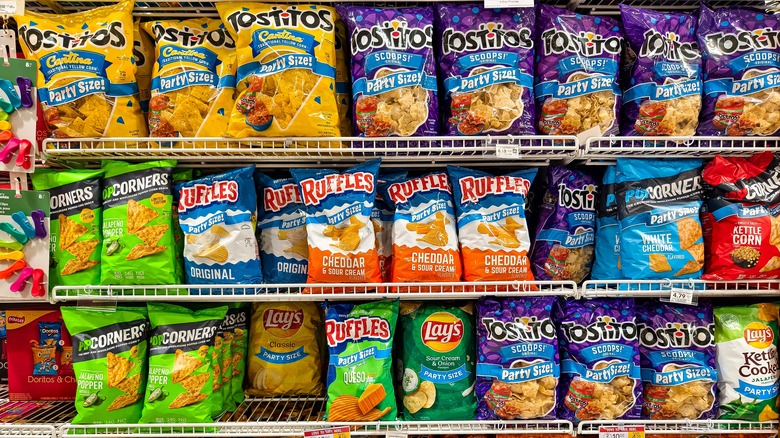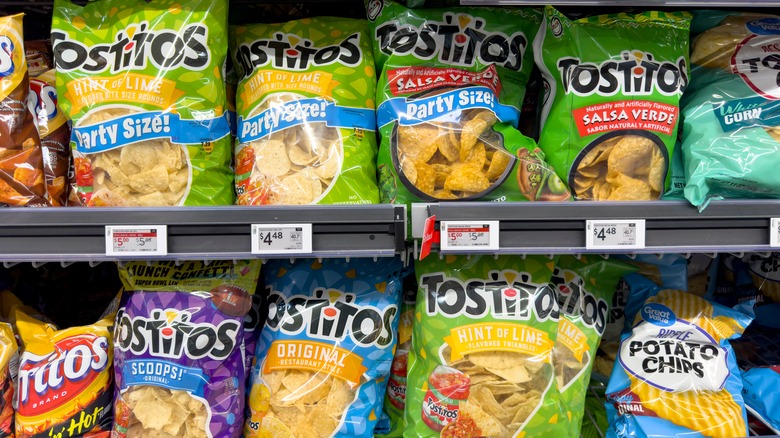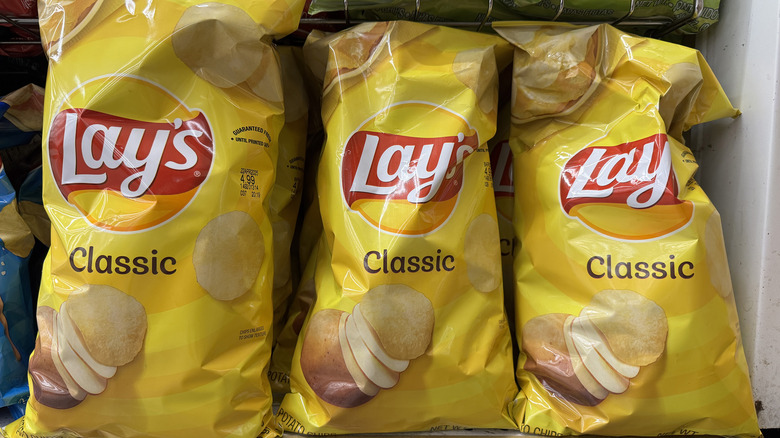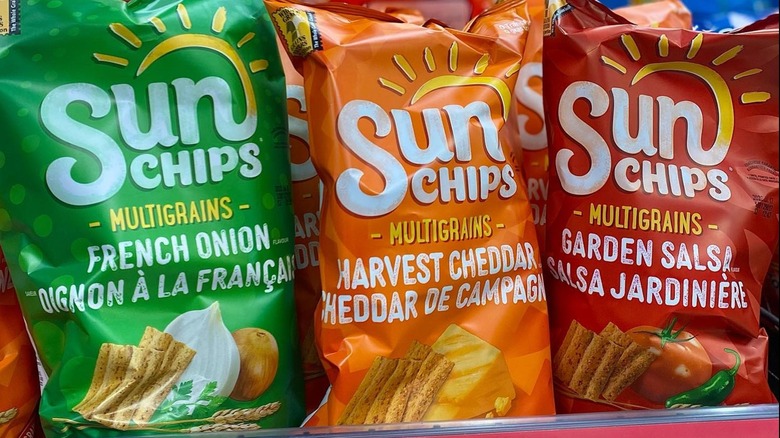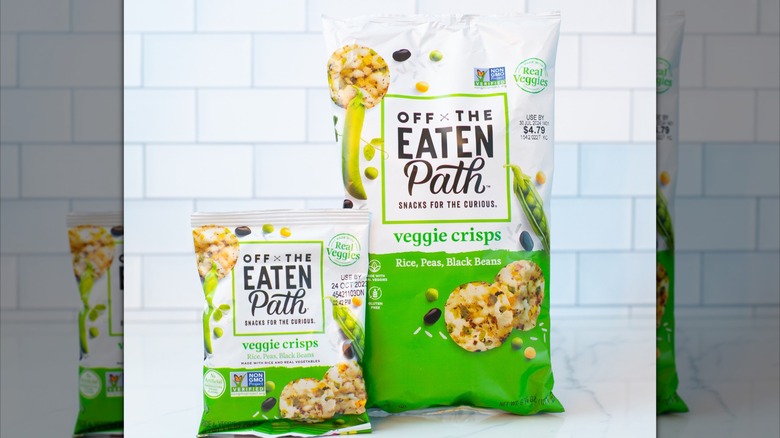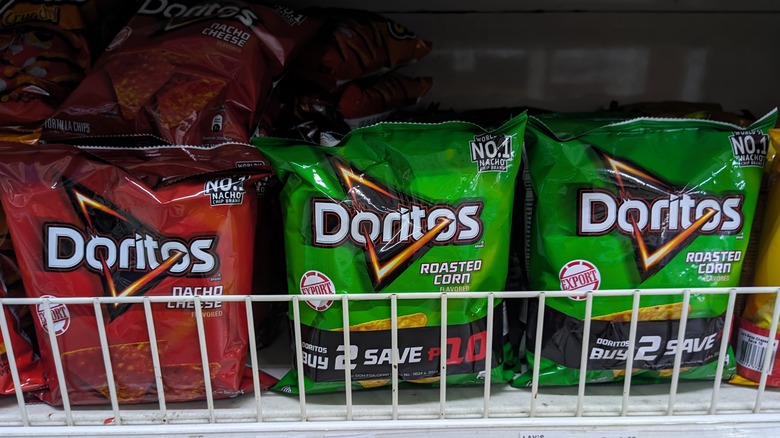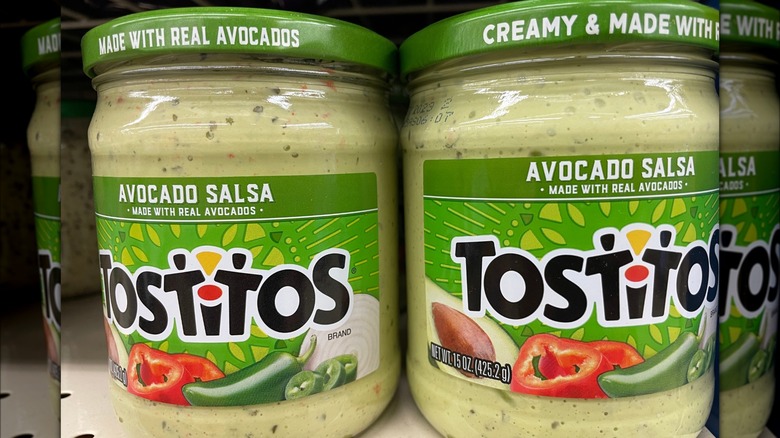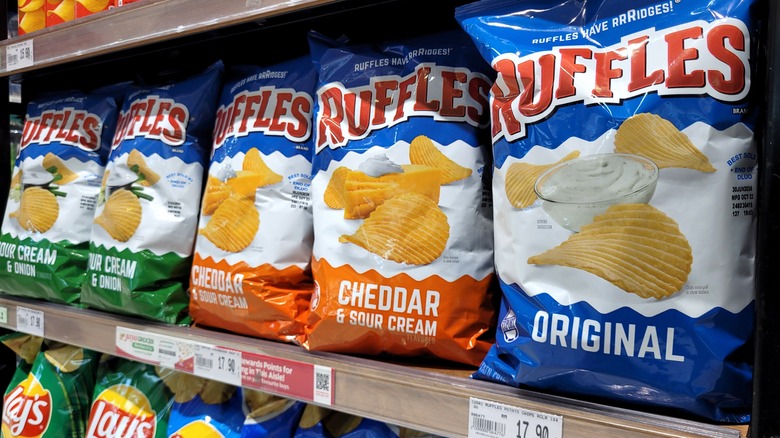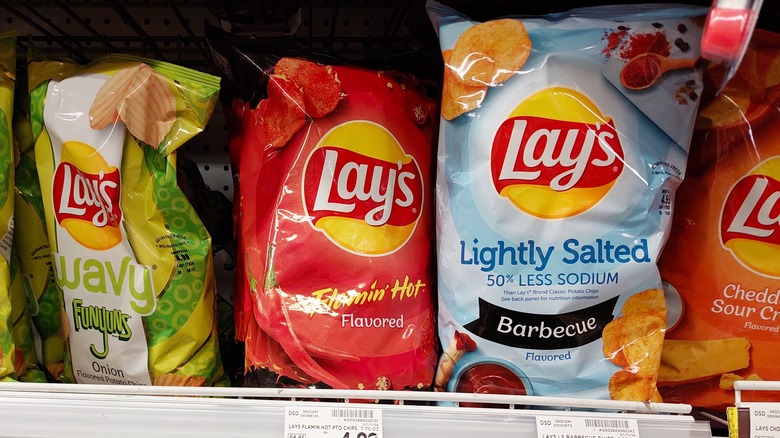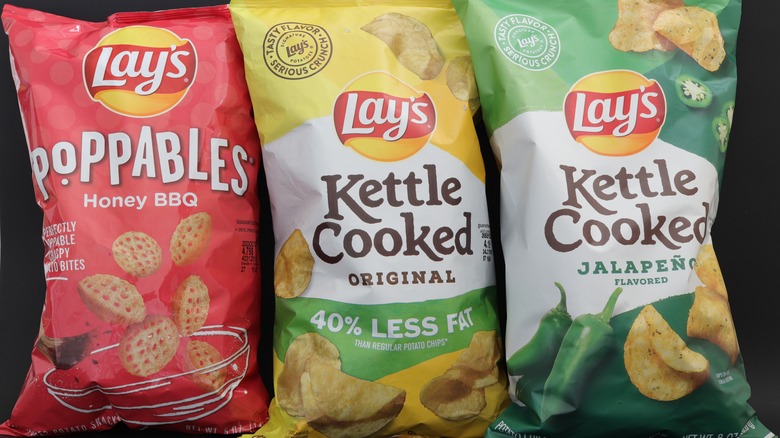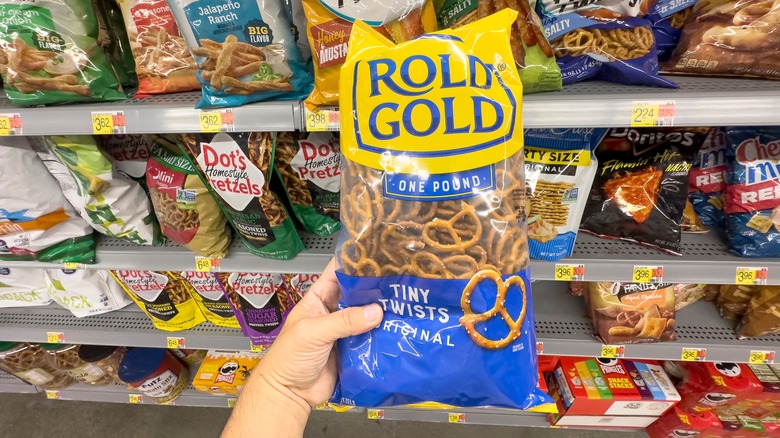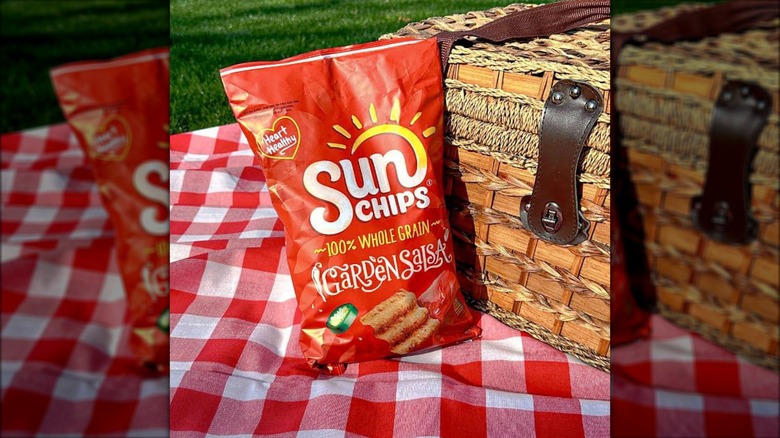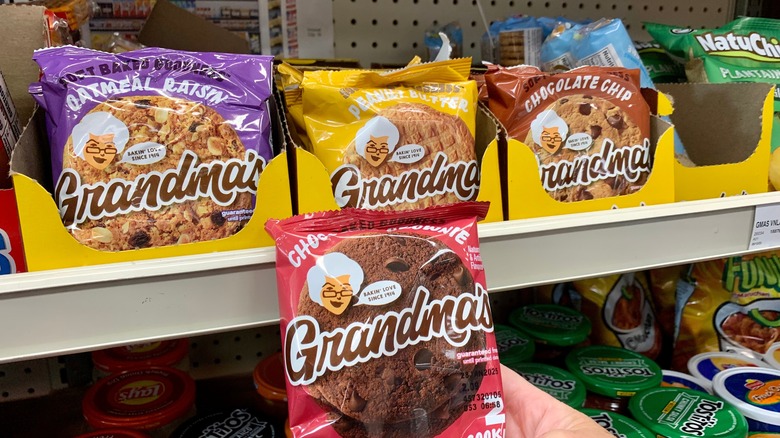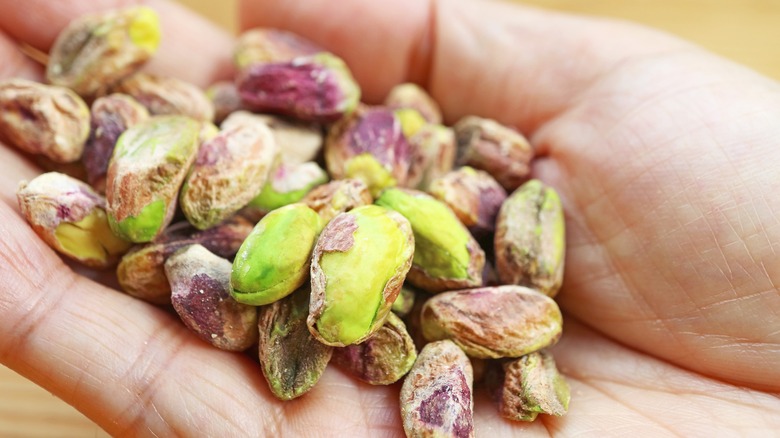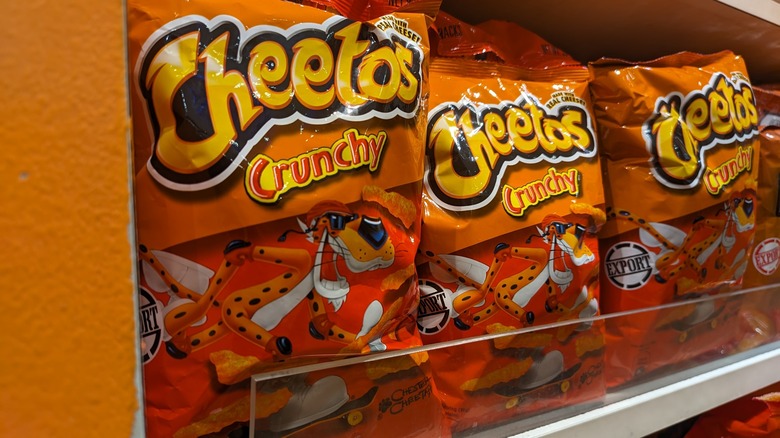Frito-Lay Recalls That Affected Millions
If you hear the name "Frito-Lay" and only think of Lay's potato chips, you're thoroughly underestimating just how mammoth this company is. Frito-Lay refers to a big umbrella beneath which sits a bevy of your favorite snack food brands, including, yes, Lay's, but also Doritos, Cheetos, Stacy's, Smartfood, Fritos, SunChips, Cracker Jack, Tostitos, Ruffles, and more.
With so many brands on its roster, it tracks that Frito-Lay would run into the odd recall over the years. Food recalls are on the rise nowadays, but if you're not familiar with the exact term, it's when a brand or manufacturer removes its products from circulation due to a possible risk to public health. In some serious cases, the Food and Drug Administration (FDA) or the Department of Agriculture (USDA) may also order a recall.
There have been a number of these recalls throughout Frito-Lay's history, some of which have been deemed potentially life-threatening to select customers. These are the ones you need to know about.
Tostitos tortilla chips recalled due to undeclared milk (2025)
In March 2025, Frito-Lay recalled bags of Tostitos Cantina Traditional Yellow Corn Tortilla Chips. While the company recalled a relatively small number of bags of chips — just 1,300 bags — the problem is that those bags were spread out over a large portion of the U.S. and a wide variety of stores and websites, meaning that finding the impacted bags was a bit like finding a needle in a haystack. Frito-Lay said the bags could show up across 13 different states: Alabama, Florida, Georgia, Illinois, Indiana, Kentucky, Mississippi, North Carolina, Ohio, South Carolina, Tennessee, Virginia, and West Virginia.
The problem that launched the recall? The bags were discovered to potentially include some nacho cheese tortilla chips. Since the bags don't specify that the chips could contain dairy, this could easily spell trouble for someone with a dairy or milk allergy or sensitivity. While the brand's press release on the matter clarified that no one should have any issues eating the chips as long as they don't have a dairy allergy or sensitivity to milk — and no illnesses were reported at the time of the recall — the Food and Drug Administration still noted that, for some individuals, eating the chips could result in a life-threatening reaction.
Lay's potato chips recalled due to undeclared milk (2024)
A similar milk-related issue to the Tostitos tortilla chips recall occurred less than a year earlier when Frito-Lay had to recall bags of Lay's Classic Potato Chips in December 2024. The recall covered bags of chips throughout Oregon and Washington that may have contained undeclared milk byproducts. Frito-Lay only knew about the issue after the company was alerted by a consumer.
Again, the Food and Drug Administration claimed that the issue potentially posed a life-threatening risk to those with a milk allergy. While you might think of milk allergies as relatively rare — especially compared to lactose intolerance, which impacts over 30% of the nation's population — milk allergies are actually one of the most common food allergies among children. Severe allergic reactions can cause symptoms such as hives, vomiting, coughing, and wheezing, as well as potentially fatal anaphylaxis.
SunChips and Munchies Mix recalled due to salmonella (2024)
In 2024, Frito-Lay recalled a selection of snacks, including SunChips Multigrains Harvest Cheddar Snacks and Original Munchies Snack Mix, because they were potentially contaminated with salmonella. Frito-Lay claimed that the contamination wasn't due to any mistake on its end. Instead, a third party supplied a seasoning manufacturer with an ingredient possibly contaminated with salmonella. In turn, that seasoning manufacturer then potentially passed on its own contaminated products to Frito-Lay.
Unfortunately, no one who purchased a bag of chips included in the recall would know that the snack contained salmonella unless the worst happened: foodborne illness. Salmonella doesn't make food look or smell any certain way. Instead, you only discover that you're impacted when the salmonellosis symptoms hit, including gastrointestinal distress and fever. Symptoms can appear as late as a week after eating the snacks. At that point, it can be pretty difficult to identify what you may have eaten that could have made you ill.
Luckily for Frito-Lay, no salmonella was actually found in the seasoning used in its products. However, it still pushed ahead with the recall out of an abundance of caution.
Veggie crisps recalled due to milk contaminants (2023)
Another case of Frito-Lay running into issues with dairy potentially contaminating its products occurred in 2023. Frito-Lay recalled more than 16,000 bags of its Off the Eaten Path Chickpea Veggie Crisps that were distributed across 26 different states: Alabama, Arkansas, Georgia, Illinois, Indiana, Iowa, Kansas, Kentucky, Louisiana, Michigan, Minnesota, Missouri, Nebraska, New Hampshire, New York, North Carolina, North Dakota, Ohio, Oklahoma, Pennsylvania, South Carolina, South Dakota, Texas, Virginia, West Virginia, and Wisconsin. That's quite the number of potential people impacted.
So, how does milk end up in an otherwise benign bag of chickpea crisps? After a customer complaint, Frito-Lay discovered that similar products containing a caramel flavoring — which itself contains milk — had ended up in the mix. Unfortunately, since the bags didn't declare these additions on the packaging, an unsuspecting shopper with a milk allergy would be none the wiser when they sat down to have a tasty snack, hence the recall.
Doritos recalled due to soy and wheat (2023)
As anyone with a gluten sensitivity will tell you, shopping for gluten-free junk food can be frustrating. What's even more frustrating, though, is chowing down on a bag of what you think are tasty gluten-free chips and realizing all too late that your snack contains the very thing that's going to make you ill.
Hypothetical situations like this are what prompted Frito-Lay to recall nearly 7,000 bags of Doritos in the summer of 2023. All of the bags had been distributed solely in Pennsylvania, including in vending machines and food service locations. The company discovered that not only did some of its Doritos Nacho Cheese Flavored Tortilla Chips potentially contain undeclared wheat, but they also featured undeclared soy found in Doritos Spicy Sweet Chili Flavored Tortilla Chips. At the time of the recall, the Food and Drug Administration reported that no allergic reactions had been attributed to either the wheat or soy unexpectedly found in the chips.
Tostitos salsa recalled due to mislabeled jars (2023)
It's not just your tortilla chips that are at risk of recall. In June 2023, Frito-Lay recalled some jars of its Tostitos Avocado Salsa due to mislabeling. Unlike many mislabeling incidents, it wasn't that the label was correct and the food that ended up in the packaging was wrong. Instead, the product was right, but Frito-Lay had just slapped the wrong label on each jar.
The jars still said Tostitos Avocado Salsa on the front, but the nutrition information on the back was that of another product, meaning that the salsa's milk content (which comes in the form of a whey protein concentrate) was not properly declared. While no allergic reactions had been reported at the time of recall, the Food and Drug Administration still deemed the risk to be serious or life-threatening if anyone with a severe sensitivity or allergy were to inadvertently eat the salsa, thinking it was milk-free.
Lay's potato chips recalled due to undeclared milk (2023)
No, you're not imagining it. A good portion of Frito-Lay's recalls are related to milk sneaking its way into products that very much should not contain dairy. Take another dairy-related recall for Lay's Classic Potato Chips, this time in the first half of 2023. The problem this time? The Classic Potato Chips were possibly contaminated by milk ingredients found in Lay's Sour Cream & Onion Flavored Potato Chips.
Once again, while the number of affected bags was few at just 146 in total, they were spread out over a huge area, having been distributed to grocery and convenience stores throughout four states: Connecticut, Maine, Massachusetts, and New Hampshire. This made the likelihood of pinpointing which households out of millions took home the affected chips near impossible. While no allergic reactions had been reported at the time of the recall, the Food and Drug Administration warned that eating the chips could prove dangerous or deadly for some individuals.
Ruffles recalled due to incorrect products (2021)
Sometimes, a manufacturer accidentally fills a product's packaging with an entirely different product. This was the case when Frito-Lay recalled Ruffles All Dressed Potato Chips in May 2021, with the bags going out to stores containing a different kind of potato chip than what was advertised. What was even worse was the fact that the other chips contained milk products, making this a dangerous — or, worst case scenario, deadly — mistake if the wrong person were to eat the incorrectly packaged chips.
The bags ended up solely at Sam's Club locations all across the Southeast, including Alabama, Florida, Georgia, Louisiana, Mississippi, North Carolina, South Carolina, Tennessee, and Virginia. This wasn't the first Ruffles recall of its kind in 2021. Frito-Lay also recalled party-size bags of Ruffles Original Potato Chips that had been distributed throughout Iowa, Kansas, Missouri, Nebraska, Oklahoma, and Arkansas in January. The reason was the same. Each bag was inadvertently filled with the wrong chips, and those wrong chips contained undeclared milk.
Barbecue chips recalled due to incorrect product (2019)
In the late 2010s and early 2020s, opening a bag of potato chips and blindly grabbing a fistful seemingly came with a surprising amount of risk. You never knew when you'd come away with a snack that was very much not what you expected. In June 2019, Frito-Lay issued yet another recall due to bags of chips being filled with a flavor different from what was advertised on the packaging.
In this instance, bags of Lay's Lightly Salted Barbecue were filled with an undisclosed flavor of chips that contained milk ingredients. The chips had been distributed through a good swath of the country, including in Arkansas, Arizona, California, Colorado, Idaho, Iowa, Kansas, Louisiana, Minnesota, Missouri, Mississippi, Montana, North Dakota, Nebraska, New Mexico, Nevada, Oklahoma, Oregon, South Dakota, Tennessee, Texas, Utah, Washington, and Wyoming before the problem was caught. Fortunately, the Food and Drug Administration said that no adverse reactions had been reported at the time of the recall.
Kettle Cooked chips recalled due to salmonella (2017)
Salmonella makes another appearance in the Frito-Lay timeline of potentially hazardous food recalls. In 2017, Frito-Lay recalled bags of Lay's Kettle Cooked Jalapeño Flavored Potato Chips and Miss Vickie's Jalapeño Flavored Kettle Cooked Potato Chips due to the potential presence of salmonella in the chips' jalapeño seasoning.
As was the case in the more recent Frito-Lay salmonella recall in 2024, this 2017 recall was the result of a supplier issue. A company that supplied Frito-Lay with the jalapeño seasoning was actually the one to experience salmonella contamination. In fact, no actual salmonella had been found directly on any Frito-Lay products. However, just to be safe, a recall was issued. At the time of recall, no illnesses had been reported.
Frito-Lay wasn't the only company impacted by the tainted jalapeño powder. Texas-based Phoenix Food, which produced a dip mix containing the powder, was also forced to issue a recall.
Pretzels recalled due to peanut residue (2016)
Peanuts are up there with shellfish and tree nuts for one of the most deadly food allergens. It's estimated that as much as 2% of the U.S. population – roughly 6 million people — has a peanut allergy. With that in mind, peanut contamination is a serious matter. When Frito-Lay found out that there was potentially peanut residue on some of its Rold Gold pretzel products in 2016, it rushed to recall a handful of varieties, including Pretzel Sticks, Pretzel Thins, and Pretzel Braided Honey Wheat.
This recall is more than just a case of mislabeled allergens. Hostess Brands had to issue a similar recall for peanut contamination around the same time as the Frito-Lay recall. Both companies had sourced flour from Grain Craft, which had issued its own peanut-related recall in April when peanut residue was detected in some of its wheat flour. The wheat was supposedly grown and processed in close proximity to peanuts.
SunChips recalled due to metal fragments (2013)
When you think about a food recall sparked by contamination, the first things that come to mind are often the likes of salmonella or an unexpected allergen. In February 2013, however, Frito-Lay found itself dealing with an even more surprising kind of contamination in SunChips: metal fragments.
The brand was forced to recall both its Creamy Roasted Garlic and Parmesan & Herb SunChips. Again, this was a recall that went much further than just Frito-Lay, with the issue traced back to a flour supplier. In this instance, the supplier was Dakota Speciality Milling, which also supplied flour to Mondelez, the producer of BelVita breakfast biscuits. The supplier said that a defective screen may have produced small fragments of metal wire that subsequently ended up in its grain blends.
If those metal fragments wound up in the flour that went to Frito-Lay and Mondelez, the SunChips and breakfast biscuits could've very well contained metal as well. It goes without saying that accidentally consuming sharp metal could pose a safety risk, hence the urgent recall.
Peanut butter cookies recalled due to milk and egg (2012)
Beyond the realm of savory snacks, Frito-Lay also owns some sweet treat brands. Its lineup includes Grandma's, maker of various oversized and sandwich cookies that bear a certain nostalgic feel. But in 2012, there was nothing warm and fuzzy about an error that saw Grandma's incorrectly label packs of its Peanut Butter Sandwich Creme cookies.
While these cookies definitely made it clear that they contained wheat, peanut, and soy ingredients, the original packaging left out warnings for two other key allergens: milk and egg, both found within an artificial butter ingredient. While we've already discussed milk allergies at length, egg allergies are no less serious, causing a range of symptoms after exposure that include rashes, hives, nasal congestion, and gastrointestinal distress. Rarely, an egg allergy can lead to anaphylaxis, which may be fatal. With roughly 2% of all children experiencing an egg allergy, it's better to be safe than sorry.
Salted pistachios recalled due to salmonella (2009)
Frito-Lay has produced a range of pistachio products, both branded as Frito-Lay and underneath its Nut Harvest brand. In 2009, Frito-Lay was forced to recall its own-brand salted pistachios due to salmonella. In this case, salmonella was detected at a Setton Pistachio processing plant in California that then went on to distribute the potentially contaminated pistachios to a variety of brands, not just Frito-Lay. Kraft was also impacted and had to recall nearly 30 Planters products and eight Back to Nature products. Overall, Setton Pistachio recalled 1 million pounds of products, all from the 2008 crop year.
You may associate foodborne illnesses and bacteria like salmonella with undercooked meats or foods that have sat out too long. However, salmonella can also grow on produce in certain environments or temperatures. For example, salmonella can multiply on pistachios if they're not handled quickly enough, such as if there's a delay between harvesting and hulling or between hulling and drying.
Crunchy Cheetos recalled due to glass (1992)
This recall occurred more than 30 years ago, but it's still possibly one of the most alarming on this list. While you expect Cheetos to be crunchy, you don't expect your Cheetos to be crunchy because they're filled with broken glass. In the winter of 1992, however, it was this fear that triggered a mass recall.
Frito-Lay recalled bags of its crunchy Cheetos distributed across Wisconsin, Minnesota, Iowa, Illinois, Michigan, Indiana, North Dakota, and South Dakota. The company cited glass particles discovered in one of its manufacturing plants. However, it did say that glass particles weren't actually found on any of the Cheetos or in any actual Cheetos bags and stressed that the recall was a precautionary measure.
Unfortunately, food recalls due to glass contamination aren't terribly rare. In 2024, a recall of canned jalapeños occurred in over 25 states due to glass contamination. In 2023, a high-end British chocolate brand, Hotel Chocolat, also recalled select sweet treats after shards of glass were found in some packages.
